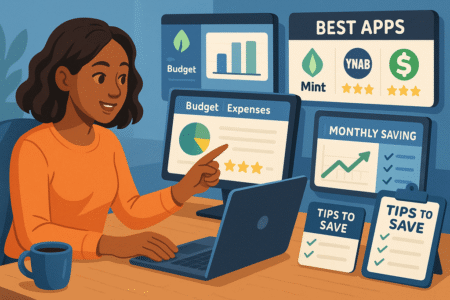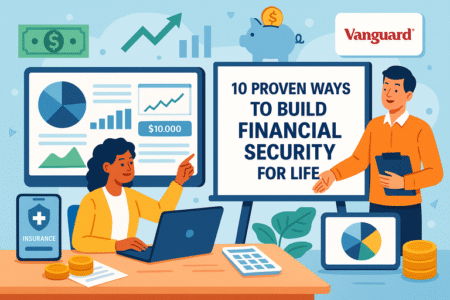Table of Contents
Financial knowledge is the foundation for making smarter money decisions, but many people feel overwhelmed about where to start.
Have you ever wondered how you can boost your understanding of money without waiting years to figure it out? The good news is that there are practical and proven ways to improve your financial knowledge fast.
This guide will walk you through seven strategies that actually work and show you how to apply them in your own life.
Read Personal Finance Books From Trusted Experts
Books are still one of the fastest ways to grow your financial knowledge because they compress decades of wisdom into a few hundred pages. The key is choosing the right books for your current level and making sure you actually apply what you learn.
Start With Beginner-Friendly Classics
If you’re just getting started, I suggest beginning with books that simplify financial principles without drowning you in jargon.
For example, The Total Money Makeover by Dave Ramsey breaks down budgeting and debt in simple steps, while Rich Dad Poor Dad by Robert Kiyosaki introduces the mindset of building assets versus liabilities.
The advantage of classics like these is that they use storytelling to help you remember key lessons.
I believe reading one chapter at a time and jotting down a takeaway you can apply immediately (like setting up an emergency fund or reviewing your monthly expenses) makes learning stick.
Think of it as your financial gym: consistent small reps build lasting strength.
A simple way to avoid overwhelm is to set a 15-minute daily reading habit. If you read at an average pace, you’ll finish a book in about 3–4 weeks, which means you could realistically absorb 12 financial books in a year without burning out.
Explore Advanced Books for Deeper Insights
Once you’re comfortable with the basics, level up with books that dig into investing, behavioral economics, or retirement planning. The Intelligent Investor by Benjamin Graham is heavier but teaches timeless investing strategies, while Your Money or Your Life by Vicki Robin helps you rethink money in terms of life energy and long-term freedom.
These books often include charts, market data, or case studies. I recommend keeping a notebook to rewrite complicated ideas in your own words—this helps you actually internalize them.
For example, when Graham talks about “margin of safety,” translate that into something practical like: “I won’t buy a stock unless I understand how the company makes money and it’s priced well below its real value.”
The deeper you go, the more you’ll notice patterns between authors, which is where real financial literacy starts to take root.
Use Audiobooks for Faster Learning on the Go
If sitting down with a hardcover feels impossible, audiobooks can be your shortcut. Apps like Audible or Libby (which connects to your local library for free) allow you to “read” while commuting, exercising, or doing chores.
Here’s a trick I use: Play audiobooks at 1.25x or 1.5x speed. At first it sounds rushed, but your brain quickly adapts, and you can cover a 6-hour book in under 4 hours. I’ve gone through entire series of finance books during long road trips, which turned otherwise wasted time into a rolling classroom.
To make it more interactive, pause after a key idea and record a quick voice note on your phone with how you might apply it.
For example, if the book explains compounding interest, record: “I’m going to set up automatic contributions into my Roth IRA so compounding works in my favor.” Those voice notes become a personalized playbook for your financial growth.
Take Advantage of Free Online Financial Courses
If you want structured learning without spending thousands on an MBA, free financial courses are a goldmine.
They’re organized, paced for self-learning, and usually taught by professionals who know how to break down complex topics into digestible lessons.
Enroll in University-Sponsored Programs
Many universities now offer free financial literacy courses online. For instance, Yale has a free version of its famous Financial Markets course on platforms like Coursera. MIT and Harvard also provide introductions to economics and investing through edX.
The beauty of these programs is that they’re designed like actual college courses. You’ll get video lectures, reading assignments, and sometimes even quizzes to check your progress.
I recommend setting aside two or three evenings a week to complete modules. Treat it like an actual class—block off time, take notes, and test yourself. That structure helps you build discipline, which is half the battle in mastering money.
Explore Platforms Like Coursera and Khan Academy
If universities feel too formal, platforms like Coursera, Udemy, and Khan Academy offer flexible options. Khan Academy has bite-sized video lessons on personal finance basics such as saving, debt, and interest rates. Coursera often partners with universities to provide certificate programs in areas like financial planning or investment management.
One smart strategy is to combine both: Use Khan Academy for quick refreshers when you need to understand a concept fast, and follow up with a Coursera course if you want depth and certification to show for your efforts.
I personally like the gamified feel of Khan Academy, where you can track progress, earn points, and visually see how concepts connect. That instant feedback makes learning addictive instead of intimidating.
Learn Specific Skills Like Budgeting or Investing
Instead of just taking general finance courses, you can zero in on skills you need right now. Want to get out of debt? Look for courses on budgeting and credit management. Curious about stocks? Try investment-focused courses that explain how to read charts, understand dividends, or manage risk.
For example, Udemy has step-by-step tutorials where you follow along on a screen while setting up a budget spreadsheet or placing a mock trade. This hands-on practice makes abstract ideas real.
Here’s how you can make it stick: after finishing a module, immediately apply one thing to your life. If the course shows how to set a 50/30/20 budget (50% needs, 30% wants, 20% savings), go into your banking app and categorize last month’s spending. That’s how theory becomes lasting knowledge.
Listen to Finance Podcasts for Daily Learning
Podcasts are one of the easiest ways to build financial knowledge because you can learn while living your life—whether that’s during your commute, workout, or even while folding laundry.
The best part? They turn complicated money topics into simple, relatable stories.
Follow Podcasts That Simplify Complex Topics
Not every finance podcast is worth your time. Some drown you in technical details, while others feel like motivational fluff. The sweet spot is podcasts that explain money in a way that makes sense to everyday people.
For example, The Dave Ramsey Show focuses on debt payoff and budgeting, using real caller stories to keep things practical. The Stacking Benjamins Show mixes humor with financial insights, which I think makes learning less intimidating. And if you’re curious about investing, BiggerPockets Money brings in guests who share actual strategies for growing wealth.
Here’s my tip: Don’t binge. Pick one podcast, follow it for a month, and take one action each week based on what you hear. If a host recommends setting up automatic savings, pause, open your banking app, and actually do it. That small step turns passive listening into real financial growth.
Use Podcasts to Stay Current With Market Trends
Podcasts are also a fantastic way to stay in touch with what’s happening in the financial world. Shows like Planet Money or The Indicator from NPR give quick takes on global events—like interest rate hikes or inflation—and break them down in plain English.
I’ve found this super helpful for connecting the dots between headlines and personal money decisions. For instance, when you hear about rising mortgage rates, you immediately understand why locking in a fixed-rate loan might save you money long-term.
Think of it as financial radar: Podcasts help you spot trends early and adjust your strategy without getting lost in a sea of complicated news.
Make a Routine of Listening During Commutes
The easiest way to stick with podcasts is to build them into your routine. If you drive, queue up an episode before pulling out of the driveway. If you take public transit, download episodes ahead of time so you don’t eat up mobile data.
When I used to commute daily, I’d finish a 30-minute show almost every morning. That’s 2–3 hours of financial learning a week without rearranging my schedule.
Even short trips add up—listening for just 15 minutes a day equals 90 hours of financial education a year. That’s basically a college-level crash course, all while you’re stuck in traffic.
Use Financial News Apps and Websites Wisely
Financial news can either sharpen your money skills or completely overwhelm you. The trick is curating reliable sources and learning how to filter information so it actually helps your decisions.
Curate Reliable Sources for Accurate Updates
Not all financial news is created equal. Some sites thrive on clickbait and hype, while others prioritize accuracy and depth. If you’re serious about improving your financial knowledge, stick with established sources.
Apps like CNBC, Bloomberg, and Reuters are great for timely updates. I also suggest bookmarking resources like Investopedia, which explains terms in plain English when you get stuck. The key here is to build a “news diet” you trust, instead of grazing on random articles shared on social media.
I usually set up my news apps with alerts for specific topics, like “retirement,” “inflation,” or “S&P 500.” That way, I get updates that actually connect to my financial goals instead of noise about short-lived market drama.
Avoid Information Overload by Setting Limits
Here’s a trap I fell into early on: Refreshing stock news every hour. Instead of learning, I just ended up stressed and confused. If you’ve ever felt that, you know what I mean.
I recommend setting boundaries.
For example:
- Limit yourself to checking financial news once in the morning and once in the evening.
- Pick no more than three go-to apps or websites.
- Use features like “daily digests” so you get summaries instead of endless streams.
Remember, the goal is clarity, not constant updates. Markets move every second, but your financial plan doesn’t need to.
Translate News Into Actionable Money Decisions
News only matters if it affects your choices. When you read an article, ask yourself: “Does this impact my money today, this year, or never?”
For instance:
- If the news says inflation is climbing, that might mean reviewing your grocery budget or asking for a raise to keep pace with rising costs.
- If interest rates are increasing, it could be a sign to refinance loans sooner rather than later.
- If a stock crash dominates the headlines, it might just be a reminder to stay the course instead of panic-selling.
I suggest keeping a simple notes app where you jot down one practical takeaway from your daily news check. Over time, you’ll build a personal playbook of decisions shaped by real-world events.
| Tool/Resource | Best For | Quick Tip |
| Finance Podcasts | Learning on the go | Commit to one episode daily |
| News Apps (CNBC, Bloomberg) | Market updates | Set keyword alerts for goals |
| Investopedia | Learning terms | Bookmark for quick lookups |
| Daily Digest Emails | Avoiding overload | Get summaries instead of feeds |
Practice With Budgeting and Investment Tools
Hands-on practice is one of the fastest ways to grow your financial knowledge because it transforms theory into action.
Budgeting and investment tools make it easier to see your money in motion, spot patterns, and build healthy habits.
Use Budgeting Apps to Track Spending Habits
If you’ve ever wondered where your money disappears each month, budgeting apps give you the answer in black and white. Apps like Mint, YNAB (You Need A Budget), and EveryDollar connect directly to your bank accounts and automatically categorize your spending.
Here’s what that looks like in practice:
- From the Mint dashboard, you’ll see a pie chart of spending categories like groceries, dining out, or subscriptions.
- In YNAB, you’ll assign every dollar a job, which forces you to plan ahead instead of reacting later.
- With EveryDollar, you can build a simple zero-based budget in under 10 minutes and see exactly what’s left for savings.
I suggest starting small: Track one month of expenses and compare it to your budget. The visual feedback is often eye-opening—like realizing you spend $200 on coffee shop runs or $300 on unused subscriptions. Once you see it, you can redirect that money toward savings or debt payoff.
Try Virtual Stock Trading Platforms Risk-Free
If investing feels intimidating, virtual stock trading platforms let you practice without risking real money. Apps like Investopedia Simulator or Webull Paper Trading give you fake funds to buy and sell stocks in real-time markets.
This hands-on approach helps you:
- Understand how stock orders work (market vs. limit orders).
- See how news events impact prices.
- Experiment with strategies before putting real money on the line.
I personally recommend setting up a “test portfolio” with a theme—like investing only in renewable energy companies or tech stocks. After a few weeks, review how it performs compared to the overall market.
This simple experiment teaches you about diversification, volatility, and the patience required for long-term investing.
Experiment With Goal-Setting Features in Apps
Most financial apps now include goal-setting tools, and they’re incredibly powerful for motivation. For instance:
- In Mint, you can set a goal like “Save $1,000 for an emergency fund” and watch your progress bar fill up.
- In YNAB, you can create categories like “Vacation” or “Car Down Payment” and assign funds toward them each month.
- Many banking apps also let you nickname sub-accounts, so you can literally see “Dream Home Fund” growing.
I find these features useful because they connect your day-to-day spending decisions with long-term goals. Every time you skip a takeout meal and move $20 into your vacation fund, you’re reinforcing the habit of choosing future rewards over instant gratification.
Join Online Communities and Financial Forums
Building financial knowledge isn’t just about reading or listening—it’s also about learning from people who are on the same journey. Online communities and forums provide real-world insights you won’t find in textbooks.
Ask Questions and Learn From Real Experiences
In forums like Reddit’s r/personalfinance or Bogleheads, people post real questions about debt, budgeting, or investing—and you get to see dozens of practical answers from people who’ve been there.
I once saw a post from someone paying off $100k in student loans. The responses included tips on refinancing, side hustles, and mental strategies for staying motivated. That kind of lived experience is invaluable because it’s advice from people who’ve walked the path, not just theory.
If you’re shy about posting, start by reading threads that match your situation. You’ll be surprised how many people share the same struggles you’re facing.
Follow Discussions on Emerging Financial Topics
Online communities also help you keep up with new trends. For example, during the crypto boom, forums were filled with debates about risks versus rewards.
While you shouldn’t blindly follow advice, these discussions give you a sense of what’s happening in the financial world.
The key is balance: Absorb ideas, but always cross-check with trusted sources before making a decision. Forums can spark curiosity, but critical thinking protects your wallet.
Share Your Own Progress to Reinforce Learning
One of the most powerful ways to solidify financial knowledge is by teaching it. When you share your own progress—like posting a debt payoff milestone or how you cut your grocery bill in half—you not only inspire others, but you also reinforce your learning.
For example, explaining how you applied the 50/30/20 budgeting rule in a forum thread forces you to articulate the process clearly. That exercise cements it in your own mind, turning knowledge into a skill you can use for life.
Work With a Financial Mentor or Coach
Sometimes the fastest way to accelerate your financial knowledge is to learn directly from someone who’s been down the road before you. A mentor or coach can provide the personalized guidance that books and apps simply can’t.
Gain Personalized Advice Tailored to Your Goals
A mentor can look at your unique situation—your income, debts, goals—and give advice that fits. For instance, while general advice says “Pay off high-interest debt first,” a coach might suggest you focus on building a small emergency fund first if your job feels unstable.
That nuance makes all the difference. I believe even one session with a knowledgeable financial coach can save you months of trial and error.
Learn Through Real-Life Examples and Guidance
Mentors often share their own stories of mistakes and successes. Hearing how someone else navigated a housing crash, built a retirement portfolio, or bounced back from bad debt gives you context that no textbook can replicate.
It’s like having a financial GPS—you still drive the car, but they help you avoid dead ends.
Hold Yourself Accountable With Expert Support
One of the biggest benefits of a mentor or coach is accountability. It’s easy to set goals but much harder to stay consistent. When someone checks in on your progress, you’re far more likely to follow through.
For example, if your coach expects an update on your monthly budget, you’ll actually make sure it gets done. That accountability can be the missing piece that turns good intentions into real results.
Pro Tip to Apply Immediately
Pick one tool or resource from this guide today and commit to using it consistently for the next 30 days. It doesn’t matter if it’s downloading a budgeting app, joining a forum, or queuing up a finance podcast for tomorrow’s commute.
The secret to improving your financial knowledge isn’t doing everything at once—it’s taking one small, consistent step and letting the results compound over time, just like money does.






